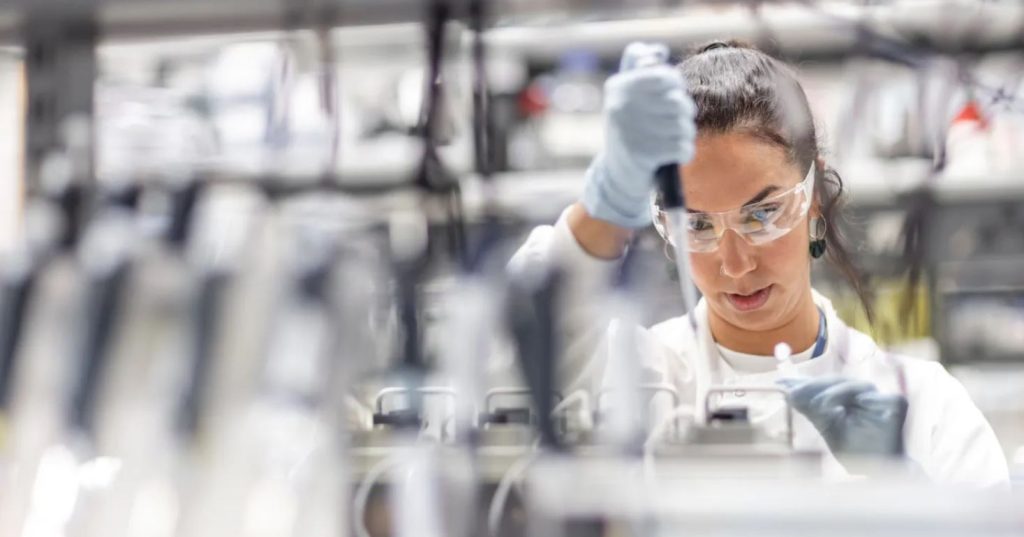
Author: Professor James Barlow
In 2024, the UK dropped out of the top ten countries in global manufacturing rankings.[i] The decline reflects long-standing structural weaknesses that stretch back decades, including a lack of coherent industrial strategy and inconsistent policies, inadequate adoption of innovation and productivity-enhancing practices, and insufficient investment in workforce training. These have left many of our manufacturing industries without a solid foundation for global competition. Compounding these challenges, geopolitical shifts have also led to other countries overtaking the UK – Russia’s surge in defence industry spending, a manufacturing boom in Mexico spurred by Chinese investment seeking to bypass US tariffs, and Taiwan’s continued dominance in semiconductor production.
Innovation without impact
Does this matter? According to a widely held narrative, the UK lies at the global scientific frontier in key technologies such as life sciences and advanced computing. Yet, the UK often struggles to translate this cutting-edge research into commercial success, limiting its ability to produce world-leading companies. There are also concerns that even the belief in the UK’s scientific performance may be misplaced. Recent research[ii] on some of the priority technologies described in the UK’s 2021 National Integrated Review (engineering biology, AI, and quantum computing) concluded that while the UK performs reasonably well despite low investment, there are real questions about our ability to remain competitive in the long term. Addressing this will require attention to the level, focus and nature of science funding in the UK. But it also requires an ability to turn scientific breakthroughs into companies that grow into global players.
Life sciences: opportunities to unlock growth
A case in point is life sciences, where the UK is recognised for its strengths. Much of this science feeds the biopharma sector, where the UK has two of the world’s largest companies, AstraZeneca and GSK. However, growth in biopharma gross value added (GVA) has stalled and the UK has fallen behind other competitor countries in international rankings.[iii] Moreover, much of our pharma manufacturing capacity has been transferred abroad and the environment for conducting clinical trials has been problematic for several years.
The potential for future growth in the sector is there. The Government’s proposed industrial strategy prioritises life sciences, including biopharma innovation. The UK could leverage its AI capabilities and the NHS’s extensive health data to accelerate drug development and enhance the flow of research breakthroughs into commercial applications. As well as AstraZeneca and GSK, around 500 smaller biopharma companies—three-quarters of which demonstrate measurable research output—indicate a strong foundation for growth.[iv]
A critical question is whether the UK can translate its scientific strengths into GVA for the UK economy. Small companies with promising products are often acquired by US and other foreign investors. While UK biopharma companies outperform their European peers in securing early-stage funding, they raise less late-stage growth financing. This makes it preferrable to seek acquisition by a large pharmaceutical company or possibly an IPO in the USA, where the average IPO size is significantly higher than in the UK.[v]
Between Q3 2023 and Q3 2024, there were 130 mergers and acquisitions (M&A) in the UK pharmaceutical sector, valued at $15 billion, with most involving foreign buyers. [vi] This activity is not inherently detrimental – it can bring capital and global collaboration opportunities – but it also raises concerns about the UK losing control over innovative assets, intellectual property, and the ability to independently drive growth. There are also risks of job relocations and profits being redirected overseas. The volume of
M&A activity signals the need for a strategy that ensures the UK retains the economic benefits of its life sciences innovation.
Delivering an industrial strategy
The Government’s proposed industrial strategy offers some hope. We welcome the framework provided by the overarching eight sectors set out in the Green Paper. We also believe that it is right to concentrate on sectors – such as biopharma – rather than technologies, as productivity growth is a function of how technology is used by firms to generate value. The approach provides a clear departmental sponsor for each sector.
However, two dangers risk the industrial strategy being blown off track:
- First, a limited understanding of the nature and dynamics of industries which are rapidly evolving because of technology innovation and changing markets. The eight sectors are very broad, comprising ecosystems of players spread across different industries. It is important that the next phase of the industrial strategy captures the distinctive features of each sector – the configurations of players and technology innovations that shape them. Some industries also form part of larger sectors that might currently be small in terms of their overall contribution to the UK economy but have significant growth prospects or the potential to drive growth elsewhere in the economy. These should not be neglected. Understanding the changing dynamics of sectors and ensuring that strategies are well-crafted (and industry-led) will increase the likelihood that they deliver the growth that is needed.
- Second, there are dangers that the ambitions of the industrial strategy are undermined by other policies. Fifty economists and other experts recently warned that easing post-2008 rules designed to prevent excessive risk-taking, and giving the Financial Conduct Authority a remit to promote growth in financial services, could harm efforts to stimulate the wider economy.[vii] Research suggests that once a country’s financial sector grows past a certain point, it can lead to productive investment being crowded out [viii], misallocation of resources [ix], and undue influence by a powerful financial sector on policymaking. Studies [x] suggest that large financial sectors have negative effects on economies when private credit is the equivalent of at least 100% of GDP – in the UK, this averaged 160% since 2000. For businesses, especially SMEs such as the biopharma companies discussed earlier, a tangible outcome is that there has long been a shortfall in investment to finance their growth.
Being ‘open for business’ should not mean blindness to the consequences of losing control over promising UK technology companies. Ensuring there is coherence in both industrial and financial policy will be key to success in the growth agenda for the UK economy.
About Centre for Sectoral Economic Performance (CSEP) at Imperial College London.
The goal of CSEP is to help improve the competitiveness of the UK economy and drive economic growth by bringing together the UK’s leading experts from science, technology and business. Since we started work last January, we have begun an ambitious programme of research and engagement with industry and government to co-design strategies for our key industries. Amongst our activities for 2025, we will be launching new reports on the UK’s aerospace, automotive, data science, telecoms, and tidal energy sectors. We are continuing our research on productivity in the biopharma sector and running a series of regional events to develop a health technology industry strategy.
[i] UK manufacturing seen ‘chronic underinvestment’, but Labour’s industrial strategy could be a ‘beacon of hope’
[ii] Paul Nightingale, James Phillips. Is the UK a world leader in science?
[iii] The UK Biopharmaceutical Sector 2024. CSEP, October 2024.
[iv] The UK Biopharmaceutical Sector 2024. CSEP, October 2024.
[v] McKinsey. The UK biotech sector: The path to global leadership. 2021.
[vi] GlobalData – Deals Database.
[vii] Response to Financial Services Growth and Competitiveness Strategy Call for Evidence.
[viii] For example, by focusing on short-term returns and financial metrics such as dividend payouts rather than productivity-enhancing investment.
[ix] Because financial institutions engage in extracting value from the economy rather than creating it.
[x] By the International Monetary Fund and Bank for International Settlements. See Positive Money.

